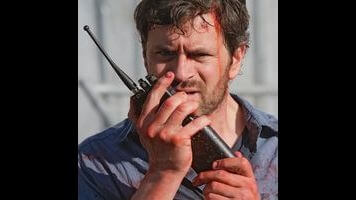Z Nation isn’t Sharknado with zombies

Z Nation is Syfy’s stab at having a Walking Dead-type hit on its hands. To the casual observer (or at least The Hollywood Reporter), it could appear to be a direct rip-off, but Z Nation is able to stand separate from whatever influence that other series might have on it. Z Nation even tips its hat to the AMC show, with Mark Hammond (Harold Perrineau) mentioning how he heard talk of “an ex-cop and some others taking refuge in a prison.” While survival has always been The Walking Dead’s main thrust, saving the world and looking good doing it is Z Nation’s immediate goal.
Audience expectations for Z Nation—both negative and ironically positive—are understandable. While Syfy’s original movies are a talking point of so-bad-it’s-good glee, the network’s original series have done well to shy away from that sort of thing. Syfy series typically choose genuine quality over quick bucks and cheap buzz. This is, after all, the network that produced critical gems like Battlestar Galactica and Alphas while also being responsible (in partnership with Z Nation studio The Asylum) for the Sharknado series, Mega Shark Versus Mecha Shark, and Sharktopus Vs. Pteracuda. Z Nation isn’t the next Alphas, but it does a surprisingly decent job working with what’s expected of the company that produces it and the network that broadcasts it.
For starters, the dialogue isn’t a work of art. While the cold open of the pilot sets the tone of the show and gets the adrenaline pumping, it’s in some ways the epitome of an Asylum production: stilted line readings and a “shoot first, quip, and maybe ask questions later” policy. The production values seen in the pilot are slightly higher than typical Asylum fare, too. In fact, the zombie makeup is top-notch, and the show is able to employ its jump scares well enough (thanks in part to it’s fast-moving zombies) that there’s nothing laughable about Z Nation’s undead. Trouble only sets in when it’s time to get up close and fight the zombies: The pilot never looks worse than when the visual effects for its zombies and its guns kick in.
The characters of Z Nation fit into neat little boxes, which form a handy checklist for deciding whether or not you’ll like these characters moving forward. Mark is the de facto leader, overseeing the cross-country transport of humanity’s last hope: a criminal (Keith Allan) who survived eight zombie bites during an experimental search for a cure. There’s Charles Garnett (Tom Everett Scott), a natural born commander and the conscience of this whole piece. Roberta Warren (Kellita Smith) is Charles’ second-in-command and a no nonsense sort of woman.
Along the way, more people join the protagonists’ cause—at the rate the pilot goes, every surviving human will be a part of the group by series end. The one character who doesn’t click right away is the one who’s allowed to join in on the group fun: It’s not quite clear from the pilot if a year stuck in an Arctic communications center drove Simon “Citizen Z” Cruller (D.J. Qualls) to madness, but it’s really the only way to explain his absurd, episode-ending speech.
But even with that character’s weakness, Qualls is a strong enough performer to pull off Citizen Z’s eccentricities. The main thing that sticks out about Z Nation is the acting caliber of its cast. Unlike feature-length Asylum productions, the show clearly isn’t full of the Ian Zierings, Tara Reids, or Jared Fogles of the world. Z Nation gives off the impression that this is how entertaining an Asylum project can be when the talent involved is actually trying. It’s not a Walking Dead rip-off; if anything, it’s closer to Robert Rodriguez’s Planet Terror contribution to Grindhouse. Near the end of the pilot, there’s a scene that qualifies as both the year’s most ridiculous TV moment and the best ever use of an infant in a zombie series.
Z Nation isn’t trying to be an introspective character study. It’s a B-movie horror show that would much rather give the audience a fun time than make them think about the human condition. (But if someone comes out of watching the show thinking about the human condition, then it’s a double win for Z Nation.) Still, the show’s glimpses at the post-outbreak world are fascinating: Average life expectancy is lower, babies are rarely seen, and killing a person to prevent them from suffering a zombified fate is seen as a sign of “mercy” not to be taken lightly. These aren’t the types of things a show just accidentally falls into.
The Walking Dead is the show you watch if you want to see how people survive in a post-apocalyptic world. The Strain is the show you watch if you want to see how people allow the apocalypse to happen. Z Nation is the show you watch if you want to see zombie guts splattered across the screen—and there’s nothing wrong with that.